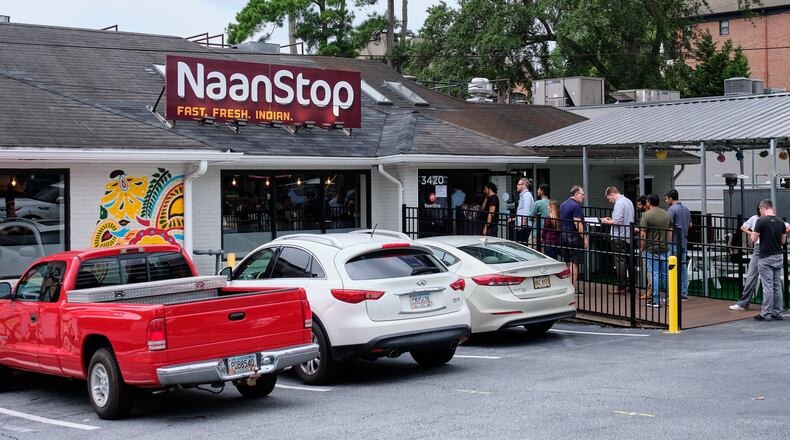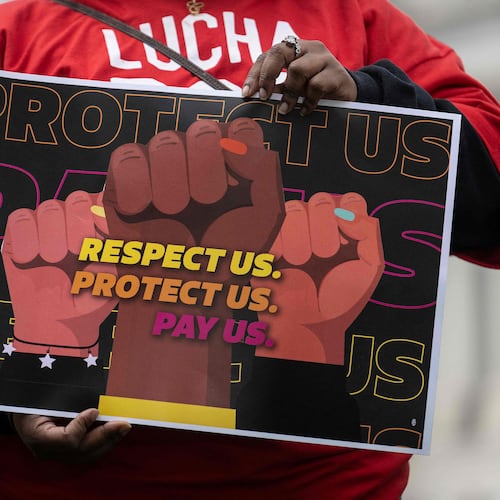The Georgia economy last month saw a surge of hiring in a range of sectors adding 15,500 jobs, nearly three times the average for April, the state Department of Labor said Thursday.
That growth kept the unemployment rate at a record low of 3.1% for the fourth consecutive month — despite more jobseekers and the 22-year high in interest rates that chill borrowing and expansion plans.
In the past year, Georgia has added 69,900 jobs, said Bruce Thompson, the state’s labor commissioner. “Jobs for Georgians is something we take seriously in the Peach State.”
The most energetic hiring last month came in corporate jobs, manufacturing and health care.
Still, the market shows some signs of moderation. The number of job openings in Georgia has fallen by 36% from highs of late 2021, the share of working-age Georgians in the workforce has increased and layoffs have ticked up, the Department of Labor said.
The balance of workers and hiring has shifted since 2022 when the need for workers was often acute, wages were rising the employees were quitting at record rates — often to find better pay or hours.
While the tilt to the advantage of workers is not as dramatic as it was through much of 2021 and 2022, a survey this month by Resume Builder, an online career adviser, found that one quarter of job-seekers found a new job within a month and about two-thirds received multiple offers.
Hospitality hiring still lags
In some ways, the economy has recovered from the pandemic, returning to similar growth patterns. But in others, it is not the same and a post-COVID-19 hangover is still handicapping some sectors, especially leisure and hospitality.
As Americans gear up for a summer of travel, many hotels, restaurants and other leisure services firms are still grappling with worker shortages.
Five years ago, unemployment was low, yet there was still a deep enough pool of jobseekers for employers to find the people they needed without sweetening offers with significant raises. At the same time, while workers could not generally call the shots on pay, they could usually find a job.
Now, despite a larger population, employers have a shallower pool to pick through when hiring.
In April 2019, 184,874 people were unemployed — that is, out of work and actively seeking a job — roughly 20,000 more than today, according to the Department of Labor.
And the difference is not only in the numbers.
In 2020, the pandemic roiled American society and its economy as well. Millions of people stayed home, shifting their spending from services to goods. Many in-person businesses — especially in leisure and hospitality — shuttered for weeks or months and when they reopened, they struggled to find the employees they needed.
Attracting workers meant raising wages, sometimes dramatically.
And now, consumer spending has largely shifted back to pre-pandemic patterns, economic growth has been robust and hiring solid, yet hospitality has still not caught up.
The overall Georgia economy took 21 months to return to its pre-pandemic level. Hospitality took 37 months. And hospitality still lags the share of the economy it represented in early 2020.
Back then, hospitality accounted for 10.8% of all Georgia jobs, according to the Bureau of Labor Statistics. For the sector to reach that level, it would need to add nearly 10,000 jobs.
Although the post-pandemic landscape is a little more employer friendly, hospitality faces special challenges. For workers, many front-line jobs are relatively low-wage work that has historically had high turnover, so raises make jobs more enticing. But for employers, higher pay squeezes the bottom line — especially when the business may not be seeing as many customers as pre-pandemic.
‘Our biggest challenge’
Most of the state’s 22,915 restaurants operate on thin profit margins, said Stephanie Fischer, president of the Georgia Restaurant Association.
Average food and labor costs have climbed nearly 30% during the last four years, while more than a third of restaurants say recruiting and retaining employees is their number one concern, Fischer said.
Yet even at higher pay, it’s often better for finances to keep the employees you have, said Neal Idnani, co-owner of NaanStop, which has three locations and plans to add another in a few months.
Employee turnover has dropped, he said. “Two years ago, we were just trying to find people to fill positions and that’s it. But it’s still hard. It’s our biggest challenge.”
Fighting turnover has meant retooling the approach to hiring, but also reshaping efforts to retain employees, he said.
NaanStop has about 30 employees. Most positions now are filled through referrals from current employees who receive a bonus if they provide someone who gets hired. Once on staff, they are given regular “check-ins” with managers, aimed at hearing about any problems and offering workers a chance to ask for opportunities within the company.
“Wages are part of it, but people don’t quit jobs, they quit bosses,” Idnani said. “If things are good, they are not going to quit over 10 cents or 50 cents or a dollar.”
In hotels, pay for entry-level, frontline workers like housekeepers has climbed in five years from less than $10 an hour to about $15 an hour, but it’s not always enough to cement an employment relationship, said Dylan Patel, who owns the Courtyard Savannah Airport hotel in Pooler, near the Georgia coast.
“We put postings on Zip or Indeed,” he said. “We typically get several applications. But a lot of them don’t even show up for the interview.”
Like many industries, hotels are increasingly finding ways to get the job done, he said. “Sometimes, as the owner, you even have to jump in and do the work. There just aren’t enough hands to do everything that needs to be done, so you’re folding towels, getting rooms ready or handling the front desk.”
Many use contractors to do the work, some cut back on services like daily room-cleaning and some have placed a machine at the front desk to handle arriving guests, often with a backup by phone from someone overseas, said Vik Zaver, Georgia region director for the Asian-American Hotel Owners Association, which represents owners of 1,501 hotels, nearly 70% of the total in Georgia.
“It saves the hotelier the cost on labor and it’s more efficient,” he said. “Payroll is often the largest single cost. And you still have utilities, property taxes, sales taxes, materials and supplies and maintenance.”
Georgia jobs by the numbers
Georgia job change for April
Best: 36,800 (2005)
Worst: -24,000 (2001)
Average: 5,400
Recent: 15,500 (2024)
Georgia unemployment rate, April
Best, pre-pandemic: 3.6% (2000, 2019)
Worst, pre-pandemic: 10.7% (2009)
Average, pre-pandemic: 6.0%
Recent: 3.1%
Georgia, share of working-age people in labor force
Best, pre-pandemic: 69.3% (Oct., 1998)
Worst, pre-pandemic: 60.7% (Nov., Dec. 2015)
Average, pre-pandemic: 66.3%
Recent: 61.5% (April)
Sources: Georgia Department of Labor, Bureau of Labor Statistics
About the Author
Keep Reading
The Latest
Featured




